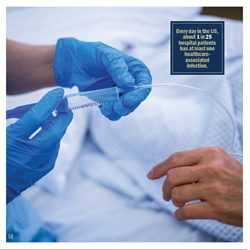NCEZID: Healthcare-Associated Infections
Healthcare-associated infections (HAIs)–infections patients can get while receiving medical treatment in a hospital or other healthcare facility–are a major, yet often preventable, threat to patient safety. On any given day, about 1 in 25 hospital patients has at least one HAI.
Modern healthcare employs many types of invasive devices and procedures to treat patients and to help them recover. Infections can be associated with devices used in medical procedures, such as central lines, catheters, or ventilators. Infections may also occur at surgery sites, known as surgical site infections.
What We’re Doing
Our mission is to protect patients and healthcare personnel and promote safety, quality, and value in healthcare delivery systems. NCEZID’s HAI experts, together with healthcare and public health partners, work to bring increased attention to HAIs and prevention. And studies show it works: when healthcare facilities take steps to target prevention of specific HAIs, they can decrease these infections by more than 70%.
HAI data are used to identify problem areas, measure progress of prevention efforts, and ultimately eliminate HAIs. NCEZID provides data on HAIs through:
- NCEZID’s National Healthcare Safety Network (NHSN) is the nation’s most widely used HAI tracking system. NHSN provides facilities, states, regions, and the nation with data needed to identify problem areas, measure progress of prevention efforts, and ultimately eliminate HAIs. In addition, NHSN allows healthcare facilities to track antimicrobial use and resistance, healthcare safety issues, and important healthcare process measures such as influenza vaccination status of healthcare personnel and infection control adherence rates.
- CDC’s annual National and State Healthcare-Associated Infections Progress Report (HAI Progress Report) provides a closer look at the HAIs most commonly reported to CDC’s NHSN. This report describes national and state progress in preventing central line-associated bloodstream infections, catheter-associated urinary tract infections, select surgical site infections, hospital-onset Clostridium difficile infections, and hospital- onset methicillin-resistant Staphylococcus aureus (MRSA) bacteremia (bloodstream infections).
Every day in the US, about 1 in 25 hospital patients has at least one healthcare-associated infection.
- Page last reviewed: August 28, 2017
- Page last updated: August 28, 2017
- Content source:
Centers for Disease Control and Prevention
National Center for Emerging and Zoonotic Infectious Diseases (NCEZID)


 ShareCompartir
ShareCompartir
